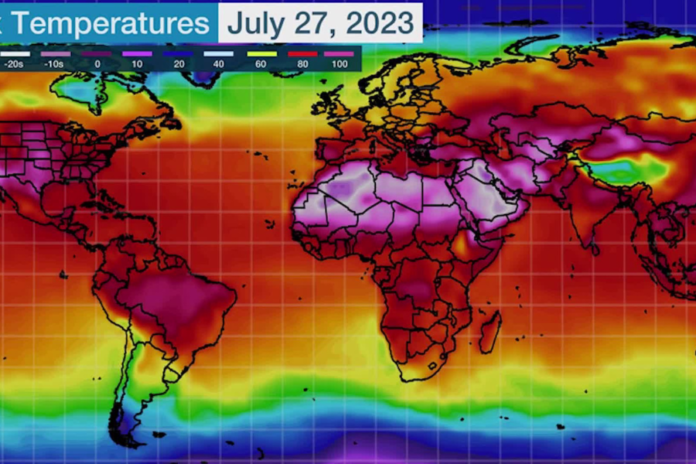Many more endured sweltering temperatures across the American Southwest while hundreds of visitors fled wildfires last week on the Greek island of Rhodes, which scientists now claim was the world’s hottest month on record.
According to research published on Thursday by Leipzig University in Germany, this month’s average worldwide temperature will be about 1.5 degrees Celsius (2.7 degrees Fahrenheit) higher than the pre-industrial average, breaking previous heat records.
According to data from the European Union, July 2023 would be at least 0.2C (0.4F) warmer than July 2019, which was the previous leader in the 174-year observational record.
The gap between now and July 2019 is “so substantial that we can already say with absolute certainty that it is going to be the warmest July,” Leipzig climate scientist Karsten Haustein said.
Michael Mann, a climate scientist at the University of Pennsylvania, stated that it was evident by mid-July that it was going to be a record warm month and gave a “indicator of a planet that will continue to warm as long as we burn fossil fuels”.
The average global temperature for July is typically approximately 16C (61F), including the winter in the Southern Hemisphere. However, in July 2023, it soared to about 17C (63F).
“We may have to go back thousands if not tens of thousands of years to find similarly warm conditions on our planet,” Haustein said.
The gap between now and July 2019 is “so substantial that we can already say with absolute certainty that it is going to be the warmest July,” Leipzig climate scientist Karsten Haustein said.
Michael Mann, a climate scientist at the University of Pennsylvania, stated that it was evident by mid-July that it was going to be a record warm month and gave a “indicator of a planet that will continue to warm as long as we burn fossil fuels”.
The average global temperature for July is typically approximately 16C (61F), including the winter in the Southern Hemisphere. However, in July it soared to about 17C (63F).
“July is almost certainly the hottest month in the instrumental record,” said Piers Forster, a climate scientist at Leeds University in Britain. “The result is confirmed by several independent datasets combining measurements in the ocean and over land. It is statistically robust.”
Global Warming
Significant portions of the world have been impacted by the scorching temperatures. Death Valley in the U.S. state of California experienced the hottest night ever recorded this month, despite the fact that nighttime in the desert is generally cooler.
A township in northwest China saw record-breaking heat, with temperatures rising to 52.2C (126F).
Wildfires in Canada spread at an alarming rate. The temperatures on the Italian island of Sicily, a portion of which is engulfed in flames, reached the mid-40s, and France, Spain, Germany, and Poland all sweltered in the intense heat.
This is “the harsh reality of climate change and a foretaste of the future,” said WMO Secretary-General Petteri Taalas.
Even the ocean is facing a considerable brunt of the consequences of global warming.
Coral reef deaths have been a concern as marine heatwaves have developed along coastlines from Florida to Australia.
Even Antarctica, one of the coldest regions on Earth, is experiencing heat waves. In the Southern Hemisphere’s winter, when sea ice should shortly be at its maximum extent, it is currently at a record low.
In the meantime, India, South Korea, Japan, and Pakistan have been inundated by floods and record rainfall.
“Global mean temperature (itself) doesn’t kill anyone,” said Friederike Otto, a scientist with the Grantham Institute for Climate Change in London. “But a ‘hottest July ever’ manifests in extreme weather events around the globe.”
An El Nino event, which was caused by exceptionally warm seas in the eastern Pacific, is currently in its early phases on Earth. El Nino frequently results in higher global temperatures, accelerating the warming caused by human-induced climate change, which experts warned this week had played a “absolutely overwhelming” influence in July’s catastrophic heatwaves.
Scientists predict that 2023 or 2024 will surpass 2016 as the hottest year ever recorded.



